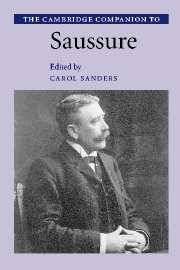Book contents
- Frontmatter
- Introduction: Saussure today
- Part I Out of the nineteenth century
- Part II The ‘Course in General Linguistics’
- Part III After the Cours
- 7 Saussure and American linguistics
- 8 Saussure and structuralist linguistics in Europe
- 9 The Russian critique of Saussure
- 10 Saussure, Barthes and structuralism
- 11 Saussure’s anagrams
- 12 Saussure and Derrida
- Part IV New debates and directions
- Notes
- Works by Saussure and further reading
- References
- Index
8 - Saussure and structuralist linguistics in Europe
from Part III - After the Cours
Published online by Cambridge University Press: 28 May 2006
- Frontmatter
- Introduction: Saussure today
- Part I Out of the nineteenth century
- Part II The ‘Course in General Linguistics’
- Part III After the Cours
- 7 Saussure and American linguistics
- 8 Saussure and structuralist linguistics in Europe
- 9 The Russian critique of Saussure
- 10 Saussure, Barthes and structuralism
- 11 Saussure’s anagrams
- 12 Saussure and Derrida
- Part IV New debates and directions
- Notes
- Works by Saussure and further reading
- References
- Index
Summary
It is difficult to depict - even with broad strokes - the fortune of Ferdinand de Saussure's work in the French context. This context is characterised by a whole series of historical paradoxes which arise out of some of the deeply rooted characteristics of French linguistic culture: the power of academic grammar in the social context of universal schooling from the 1880s; the status of normative grammar; the status accorded to the 'genius' of the French language; the very late setting up of linguistic studies (compared with Germany). But from the perspective which interests us here, these negative reasons also have a positive counterpart, which is no less paradoxical: in French culture from the 1960s/1970s on (in fact since the Second World War, although less noticeably so) Saussure, or at least the Cours edited by Bally and Sechehaye, has been present in every branch of the social and human sciences and philosophy.
France did not have a ‘linguistic circle’ like those of Prague, Copenhagen, Geneva and New York, and the organisational dynamics required to bring in new forms of knowledge very often came up against institutional inertia. Since the end, or last third, of the nineteenth century most innovations came from outside France. Initially they came from Germany, then subsequently from the USA came the converging strands from the eastern and northern European developments of the 1920s, 1930s and 1940s. The French school of semiotics which developed in the 1970s had its origins in Greimas’s reading of Hjelmslev and Brøndal. Its repercussions and its success in French structuralism (see chapter by Ungar, this volume) are largely due to foreign contributions, which owe their favourable acceptance to a few scholars (such as Benveniste) working in prestigious but marginal institutions.
- Type
- Chapter
- Information
- The Cambridge Companion to Saussure , pp. 124 - 138Publisher: Cambridge University PressPrint publication year: 2004
- 7
- Cited by



